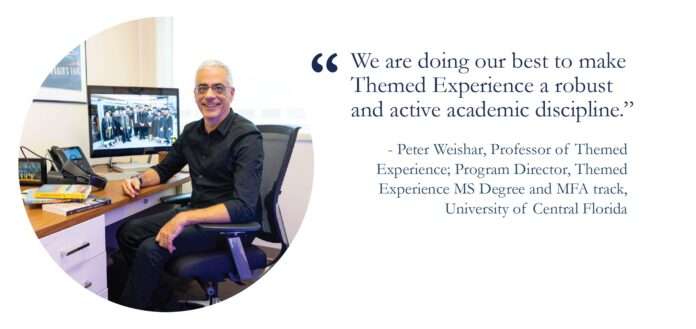TEA Service Awardee Professor Peter Weishar of UCF
interview by Judith Rubin and Martin Palicki
Peter Weishar is one of the pioneers of college-level programs helping prepare students to build careers in themed entertainment, creating a pool for recruitment and helping industry leaders give back from their experience and knowledge. His dedicated efforts often support TEA’s student member programs and enrich TEA conferences, and in general help create a productive dialogue and partnership between industry and academia. He has been named to receive the TEA Peter Chernack Award for Distinguished Service and will be honored at the Thea Awards Gala this April at the Disneyland Resort.
How did you get involved in themed entertainment?
I’ve been drawn to the arts for as long as I can remember. My father was a scenic/display designer and my mother has an Art History Masters and was a Department Chair at Parsons School of Design. I would draw for hours after school, and on weekends spend time at my dad’s display shop watching them build wonderful things. I was actually over 30 the first time I spent a significant amount of time in a theme park. I felt like I was a kid again wandering through an amazing and detailed designed world. I guess I immediately saw theme parks as a huge interactive stage set.
What do you love about this industry?
The people. There is incredible talent and genius that goes into creating narrative environments. Each person brings their own perspective and skills to a project. I love hearing their stories and learning about the unique work they do.
Tell us about your relationship with TEA.
I owe the TEA a tremendous amount. I’ve made good friends there and learned so much about the industry from meetings, conferences and just talking to fellow members. I honestly don’t think I could have accomplished what I did without the TEA.
When I was Dean of Entertainment Arts at SCAD [Savannah College of Art & Design], working on a curriculum for a masters program in themed entertainment, I met and hired an influential, former Disney Imagineer, the late George Head, as a professor. He said I should join the TEA. I owe this and a great deal more to George. His mentorship and guidance helped shape the program, and he was an amazing professor. We attended a TEA SATE conference in Orlando where Phil Hettema and his team talked about their work for the WWII Museum in New Orleans. It brought home to me all over again how powerful and impactful themed experience could be.
That adventure led to my arranging to host SATE at SCAD in 2013 – the first SATE in an academic setting. The following year, I had taken a Dean’s position at FSU, and we hosted SATE at the FSU campus in Sarasota, Florida. Now that I’m at UCF, I’m ready to talk to TEA anytime about bringing SATE to the UCF campus here in Orlando.
A great many of my former students from SCAD were part of the first wave of TEA student members. I think it is wonderful that the TEA recognizes the importance of young people entering the field. I’m currently the TEA@UCF Advisor.
This is an industry initially developed by people learning as they went along, (often building on education/experience in art, engineering, theater or film). Why is it important to have formal academic training now?
Look at the film industry. There was a time when only a fraction of film industry professionals had attended film school. Now, most successful directors and producers studied film in college. Film schools transformed that industry and led to some incredible advances in the art form. The same thing is happening in themed experience and attractions.
Graduates from themed experience and design programs have a significant advantage over students from other programs. They enter the field with focus, knowledge of the industry and pertinent skills. They understand the history and context of the business they’re entering. They have put in the time and effort to create original and focused work.
We are doing our best to make Themed Experience a robust and active academic discipline. At UCF, we have an outstanding Advisory Council of industry leaders who did their learning on the job. Their knowledge has informed how we create curriculum now, blending formal education with industry experience. Also, some eight years ago several colleagues and I founded the Themed Experience and Attractions Academic Society (TEAAS) with the goal of helping other institutions and academics develop programs in this field. Themed Entertainment is too large and important a field to be supported by just one or two institutions.
For me, the big reward is seeing a talented student grow and start on the journey to achieve their dream.
How can industry associations and their members most effectively support academic programs?
Interesting question. Most people in industry see educational outreach as just internships and hiring. That is actually the end product of an education. The more organizations can get involved in the learning process, the more effective they can be in assuring the future of our industry.
The first thing I tell everyone interested in entering the industry is “join the TEA.” There are obvious advantages to attending Summit and SATE, but even just showing up to a mixer and meeting industry professionals in a casual setting can be invaluable.
I honestly don’t know of any educational degree program that teaches everything a graduate needs to know. There will always be the years in industry that are essentially a continuation of one’s education. But an individual who spends the considerable time and effort obtaining a graduate degree in Themed Experience has shown commitment to this industry. That leads to higher retention for employers and an accelerated learning curve.
What have your students taught you over the years?
There are dozens of examples of direct learning where students find a niche area of interest and introduce me to a new designer, author or discover a little-known and fascinating fact. More importantly, each student is unique – they bring their own life experience and viewpoint into the classroom. Students have shown me how they make creative work to understand loss, adversity and even joy in their lives. I marvel at some students’ courage and creativity. It is inspiring.
Can themed experience education programs benefit working professionals in mid-career?
We have had a number of students in their late 30s and 40s. The most successful of them have confidence in their talent and ability, but realize there is always more to learn. Older students can also be a great influence on their colleagues in and out of class. I can say the majority of returning students to our program have made successful career transitions.
What’s your number one piece of advice for graduates entering the field?
Don’t be afraid to be yourself and show your own vision. Some students feel they should show work that looks like projects that are already done. A great art director looking for new talent will appreciate a unique vision and creative approach to the field.
What’s your approach to integrating mentorship and field experience into curricula?
The MFA program allows up to 11 credits of internship. That means a student could work in industry for a full year as part of their degree requirement. Our shorter MS program allows up to six credits. Here at UCF, we benefit from being in the hub of the themed entertainment industry. Speakers from industry, portfolio reviews, critiques and site visits are part of every semester at UCF, and people are open and generous with their time and expertise.
I can think of dozens of examples. A few highlights were working with Zsolt Hormay and Colleen Meyers from WDI on a character plaster class, Cecil Magpuri co-teaching a VR class in the Falcon’s Creative X-lab, the UCF Universal Creative Lab class that is going on this semester, the UCF Christie Digital Projection Mapping Lab, and the UCF/Meow Wolf Writers Workshop. Many years ago, these themed entertainment/academic collaborations got their start when Patrick Brennan, VP Walt Disney Imagineering, approved and supported an off- campus Walt Disney Imagineering class. (By the way, Patrick retired from WDI and is now a full-time Themed Experience professor at UCF.)
What parks/projects/experiences have inspired you during your career?
I am an unabashed Disney fan. One of my favorite experiences is dusk at Pandora and seeing the simulated bioluminescence start to glow in a beautifully designed environment. Another is Meow Wolf ’s House of Eternal Return. I see this kind of work as the future that can reach an entirely new audience. Going back to younger days in NYC, I particularly loved the Whitney Museum and the Metropolitan Museum of Art.
What do you do to continue your own lifelong learning goals?
I read everything I can get my hands on about the field, but I think most professors do that. For me, I try to embrace new ideas and new technology and incorporate that into what we already know and do. For example, I’ve become fascinated with AI and real-time high-resolution rendering. We are getting very close to the holodeck and I, as both geek and artist, am really excited about that.
What achievements are you most proud of ?
I’m most proud of and excited about what I’m doing right now. Helping to create a robust Themed Experience graduate program here at UCF has been an incredible journey. UCF has shared the vision and provided the support necessary to make this such a success. Just like creating a themed attraction, it is a group effort and I’m grateful for the people at UCF making it happen. • • •






